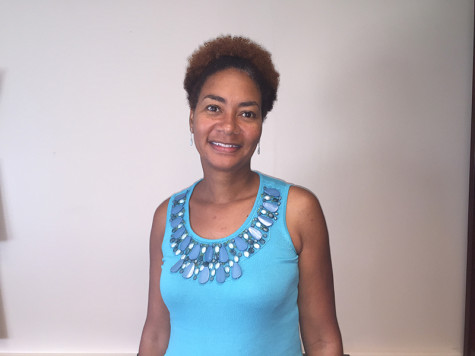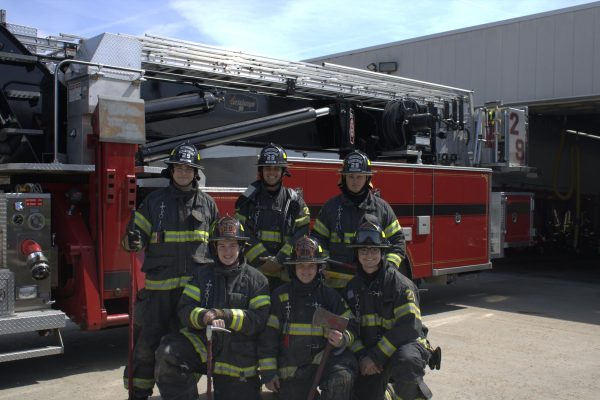Film reveals grief and loss after Katrina
Campus: How would you describe your piece to the public?
Valerie Sweeney Prince: It’s a short documentary I made just after Katrina.
I think most of the filming I did around New Years Day in 2006.
It’s about my husband who is from New Orleans and his former professor who is also from New Orleans. He went to college in New Orleans, and when the storm hit, I basically saw this story unfold. I thought it important to record it.
Really, it captures the emotion of the moment which was mourning, it was a kind of grief.
The second line is a tradition that’s associated with jazz funerals in New Orleans. You have the dirge that plays, it’s a jazz piece, that plays when the mourners are walking towards the cemetery to bury their loved one. After they put their loved one into the ground, the dirge turns to celebration and that’s the second line… those who follow after the family. The second line of mourners begins to dance and they celebrate the life that was lived.
When Katrina hit it was clear that there was a lot of loss… but we need to find a way to celebrate.
Campus: What timeline does the documentary follow?
Prince: I think the bulk of the filming was in between the 28 of December 2005 and Jan. 1, 2006. Katrina hit the last weekend of August, and then the Monday morning… around the 30, it was clear that the city was flooding, that the levees had been breached.
For some months, there was just standing water, and it receded. We traveled to New Orleans, because we were living in Virginia at the time.
Campus: What inspired you to tackle this project?
Prince: I saw it in three dimensions. I could write it, but I need to show it more than I could say.
I had a desire for people to be able to speak in their own voices. There’s a narrative, I choose how the voices are presented, but I try as hard as I could to remove myself as a voice and let the other people speak for themselves.
I am not from New Orleans, I married into New Orleans and there is a difference in that distance. Even though I was grieving the losses, I didn’t grow up in the city. I didn’t know the bakery that is no longer there, I didn’t go to that school that is no longer there.
When the things were gone, I might have noticed that they weren’t there but I didn’t have those memories. I didn’t want to intrude on the people who were basically the first line of mourners.
Campus: How long did the entire process take?
Prince: Maybe about two months.
Campus: Did you receive any help with the project?
Prince: I didn’t get much help. My son who was young at the time, when it was time to make the credits, he’s like ‘what are you doing?’ And I said ‘I’m writing the credits,’ he said ‘why? It’s just going to be mommy, mommy, mommy.’
But I didn’t get much help in the actual production, but I did in a lot of other ways. Filmmaker Royce Osborn shared some of his footage with me of some earlier second line images he had taken.
Delphiel Marcellus, of the Marcellus family, he gave me music. Without the music it would be a different film.
Technically, you will see the flaws, there are technical flaws in the film, but I think there is a lot of forgiveness because it’s not about making a beautiful, technically rendered film. I was learning as I went and even now I know more about filmmaking than I did when I started…
Campus: Have you screened this film before?
Prince: I was the only film maker in the Mid-Atlantic Black Film Festival who has two films actually, one’s a children’s story that my husband and I did and then this one, and that was in 2010.
It screened in places like Xavier University, and it screened many times in local spaces.
I haven’t shown it in a while, but it seemed like it would be a good time with the 10th anniversary and the effects of the storm are more apparent, and also other economic and social, political factors have come into play…
Campus: Did you find it difficult producing a documentary with your husband as one of the focuses?
Prince: What was difficult was that the story was actually three pronged. It was about the mother, the father and the son. What was difficult was the mother part, because that was family and they don’t want to be the subject of your film. I had to cut that part, that part of the narrative did not want to… on one level they wanted to participate and on another level it would’ve been a really bad film.
They would do it because they loved you, but beyond that, it was like, ‘I really don’t want to do this.’ So that part is absent from the film, there’s really only one reference in the film about his mother’s sickness. She had cancer. So that got left out.
In terms of my husband, he’s used to it. He’s used to talking about his artwork, being kind of in the spotlight, that wasn’t hard to do.
For me, because the story unfolded so clearly before my eyes before it actually manifested, it was just following the breadcrumbs. It was already laid out.
Campus: What was your favorite part about making “Second Line”?
Prince: It was cathartic, it was a way of publicly expressing grief. It [Katrina] was a difficult experience, and it’s like… the film becomes a public expression of mourning.
Campus: What do you hope to achieve in the panel after the screening?
Prince: I’m hoping that we’ve gotten to a place where we don’t only have to feel the grief. That we can have conversations that matter about people and places, public policies, environmental matters and that even though we are located here in the northwest of Pennsylvania, we can find ways to think about what’s happening in other parts of the country. So we can begin to take action, steps towards meaningful changes.
I think Katrina was beyond our control in a certain way, but some of the aftermath was well under our control. We have to begin to see it that way so we can accept responsibility and make policies.
Campus: What do you want the viewers to take away from the film and the whole experience?
Prince: I want them to see human beings, to see themselves as connected to the human experience. But I also want them to begin thinking of themselves as connected to one another, thinking about what it is that we need to do to make our society the kind of place we want to live in.

Valerie Sweeney Prince
Associate Professor, English






